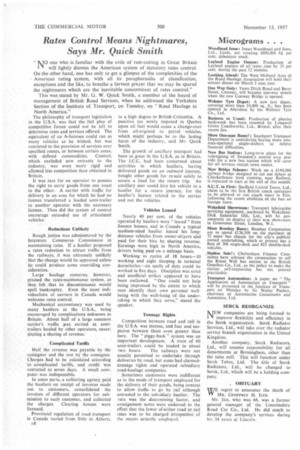Rates Control Means Nightmares, Says Mr. Quick Smith
Page 44

If you've noticed an error in this article please click here to report it so we can fix it.
NO one who is familiar with the evils of rate-cutting in Great Britain will lightly dismiss the American system of statutory rates control. On the other hand, one has only to get a glimpse of the complexities of the
American rating system, with all its paraphernalia of classification, exceptions and the like, to breathe a fervent prayer that we may be spared the nightmares which are the inevitable concomitant of rates control."
This was stated by Mr. G. W. Quick Smith, a member of the board of management of British Road Services, when he addressed the Yorkshire Section of the Institute of Transport, on Tuesday, on " Road Haulage in North America."
The philosophy of transport legislation in the U.S.A. was that the full play of competitive forces could not be left to determine rates and services offered. The equivalent of an A-licensee could run as many vehicles as he wished, but was restricted to the provision of services over specified routes, or between certain areas, with defined commodities. Control, which excluded new entrants to the industry, was even more rigid and allowed less competition than obtained in Britain_ It was rare for an operator to possess the right to carry goods from one coast to the other. A carrier with traffic for delivery in an area for which he had no licence transferred a loaded semi-trailer to another operator with the necessary Reductions Unlikely Rough justice was administered by the Interstate Commerce Commission in maintaining rates. If a haulier proposed a rates reduction to attract traffic from the railways, it was extremely unlikely that the change would be approved unless • he could produce some overriding consideration.
Large haulage concerns, however, praised the rates-maintenance system, as they felt .that its discontinuance would spell bankruptcy. Even the most individualistic of carriers in Canada would welcome rates control.
Mechanical accountancy was used by many hauliers in the U.S.A., being encouraged by complications unknown in Britain. About half of a large common carrier's traffic ras carried in semitrailers hauled by other operators, necessitating a sharing of revenue.
Complicated Tariffs
Half the revenue. was payable by the consigner and the rest by. the consignee. Charges had to be calculated ac-cording to complicated tariffs, and :credit was restricted -to seven days. A small com-. pulerwas indispensible.
In some parts, a collecting agency paid the hauliers on receipt of invoices made out to customers, consolidated the invoices of different operators for submission to each customer, and collected the charges. Clearing houses were licensed.
Provincial regulation of road. transport in Canada varied from little in. Alberta
to a high degree in British Columbia. A punitive tax newly imposed in Quebec upon oil fuel would cause a change-over from oil-engined to petrol vehicles, which might perhaps he to the lasting harm of the industry, said Mr. Quick Smith.
The growth of ancillary transport had been as great in the U.S.A. as in Britain. The I.C.C. had been concerned about activities in which hauliers, having delivered goods on an outward journey, bought other goods for re-sale solely to secure a load for the return trip. An ancillary user could hire his vehicle to a haulier for a return journey, for the haulier's licence related to the service and not the vehicles.
Nearly 40 per cent, of the vehicles operated by hauliers were " leased " from finance houses, and in Canada a typical medium-sized haulier leased his longdistance vehicles from owner-dri,yers ahd paid for their hire by sharing revenue. Earnings were high in North America. drivers being paid on a mileage basis.
Working in cycles of 18 hours-10 working and eight sleeping in terminal dormitories—six spells of duty could be worked in five days. Discipline was strict and unofficial strikes appeared to have been outlawed. " One could not help being impressed by the extent to which men identify their own personal wellbeing with the well-being of the undertaking in which they serve," stated the speaker.
Tonnage Rights
Competition between road and rail in the U.S.A. was intense, and fear and suspicion between them even greater than here. The-' piggy-back" system was an important development. Atrain of 60 semi-trailers could be loaded in about two hours. The railways were not usually permitted to undertake through deliveries by road, but some had claimedtonnage rights and operated subsidiary road-haulage companies.
Sometimes customers were indifferent as to the mode of transport employed for the delivery of their goods, being content to allow traffic to go by rail although entrusted to the subsidiary haulier. The rate was the determining factor, and consignment notes were endorsed to the effect that the lower ofeeither road or rail rates was to be charged irrespective of the means actually employed.
SERCK REORGANIZE
MEW companies are being formed to improve flexibility and efficiency in the Serck organization. Serck Radiator Services, Ltd., will take over the radiator service branch organization in the United Kingdom.
Another company, Sera Radiators, Ltd,, will assume responsibility for all departments at Birrriingham, other than the tube mill. This will function under Serck Tubes, Ltd. The title of Serck Radiators, Ltd., will be changed to Serck, Ltd., which will be a holding company.
OBITUARY
WEregret to announce the death th MR. GEOFFREY H. his. Mr. Iles, who was 66, was a former general manager of the Lincolnshire Road Car Co., Ltd. He did much to develop the company's services during his 24 years at Lincoln. "








































































































